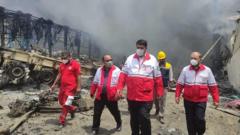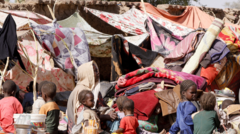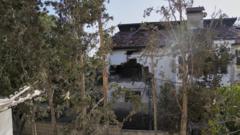The situation in Gaza becomes increasingly dire as essential food supplies run out, exacerbated by the longest blockade in its history, affecting millions.
**UN Faces Humanitarian Crisis in Gaza as Food Aid Depletes Amid Ongoing Blockade**

**UN Faces Humanitarian Crisis in Gaza as Food Aid Depletes Amid Ongoing Blockade**
The World Food Programme announces a critical shortage of food stocks due to Israel's blockade, raising alarms over rising malnutrition and severe food insecurity.
The United Nations World Food Programme (WFP) has announced that it has completely run out of food aid in Gaza after Israel's blockade has persisted for seven weeks. The WFP stated, "Today, we delivered our last remaining food stocks to community kitchens, where approximately one million hot meals are provided daily." Forecasting imminent scarcity, the organization warned that these kitchens would deplete their resources in the coming days.
Israel initially halted humanitarian aid deliveries on March 2, followed by a renewed offensive after a two-month ceasefire collapsed. This action, as stated by Israel, aims to apply pressure on Hamas regarding hostages, though the UN insists that Israel has obligations under international law to ensure the welfare of the 2.1 million Palestinians living in Gaza.
By the end of March, all 25 bakeries in Gaza that the WFP supported closed due to a lack of wheat flour and cooking fuel. Concurrently, food parcels distributed to families have also run out. The UN reports that malnutrition levels are worsening, with recent screenings of children in northern Gaza revealing more than 80 cases of acute malnutrition — double previous figures.
Dr. Tedros Adhanom Ghebreyesus, director-general of the World Health Organization, described the situation as a "grim moment" necessitating an end to the aid blockade. He stated, “Lives depend on it." The Israeli blockade has compounded the fragile food systems in Gaza, resulting in food prices soaring by as much as 1,400% compared to the prior ceasefire. The rising prices and high levels of food scarcity raise critical nutrition concerns for vulnerable populations, including young children, pregnant women, and the elderly.
The WFP warned that immediate action is required to open borders for necessary aid and trade. Without this, their program may be forced to cease entirely. They emphasized that over 116,000 tonnes of food assistance is positioned and ready to be delivered as soon as the border opens.
WFP Country Director Antoine Renard highlighted the critical need for ongoing support, especially given the displacement of more than 400,000 individuals since the renewed offensive began on March 18. He emphasized that the community kitchens are vital, as they are currently providing for only half of the population’s nutritional needs.
In response to international criticism regarding the blockade, Israel's foreign ministry refuted allegations of a lack of aid and claimed to be monitoring the on-ground situation. They asserted that they have facilitated more than 25,000 lorries of aid into Gaza during the ceasefire.
Moreover, Hamas, which has faced criticism for allegations of hijacking aid, maintains that it has not diverted assistance intended for civilians. The humanitarian crisis follows an unprecedented attack by Hamas on October 7, killing around 1,200 individuals, triggering a military campaign to eliminate the group. The ongoing conflict has resulted in an estimated 51,439 deaths in Gaza since the offensive commenced.
Israel initially halted humanitarian aid deliveries on March 2, followed by a renewed offensive after a two-month ceasefire collapsed. This action, as stated by Israel, aims to apply pressure on Hamas regarding hostages, though the UN insists that Israel has obligations under international law to ensure the welfare of the 2.1 million Palestinians living in Gaza.
By the end of March, all 25 bakeries in Gaza that the WFP supported closed due to a lack of wheat flour and cooking fuel. Concurrently, food parcels distributed to families have also run out. The UN reports that malnutrition levels are worsening, with recent screenings of children in northern Gaza revealing more than 80 cases of acute malnutrition — double previous figures.
Dr. Tedros Adhanom Ghebreyesus, director-general of the World Health Organization, described the situation as a "grim moment" necessitating an end to the aid blockade. He stated, “Lives depend on it." The Israeli blockade has compounded the fragile food systems in Gaza, resulting in food prices soaring by as much as 1,400% compared to the prior ceasefire. The rising prices and high levels of food scarcity raise critical nutrition concerns for vulnerable populations, including young children, pregnant women, and the elderly.
The WFP warned that immediate action is required to open borders for necessary aid and trade. Without this, their program may be forced to cease entirely. They emphasized that over 116,000 tonnes of food assistance is positioned and ready to be delivered as soon as the border opens.
WFP Country Director Antoine Renard highlighted the critical need for ongoing support, especially given the displacement of more than 400,000 individuals since the renewed offensive began on March 18. He emphasized that the community kitchens are vital, as they are currently providing for only half of the population’s nutritional needs.
In response to international criticism regarding the blockade, Israel's foreign ministry refuted allegations of a lack of aid and claimed to be monitoring the on-ground situation. They asserted that they have facilitated more than 25,000 lorries of aid into Gaza during the ceasefire.
Moreover, Hamas, which has faced criticism for allegations of hijacking aid, maintains that it has not diverted assistance intended for civilians. The humanitarian crisis follows an unprecedented attack by Hamas on October 7, killing around 1,200 individuals, triggering a military campaign to eliminate the group. The ongoing conflict has resulted in an estimated 51,439 deaths in Gaza since the offensive commenced.

















